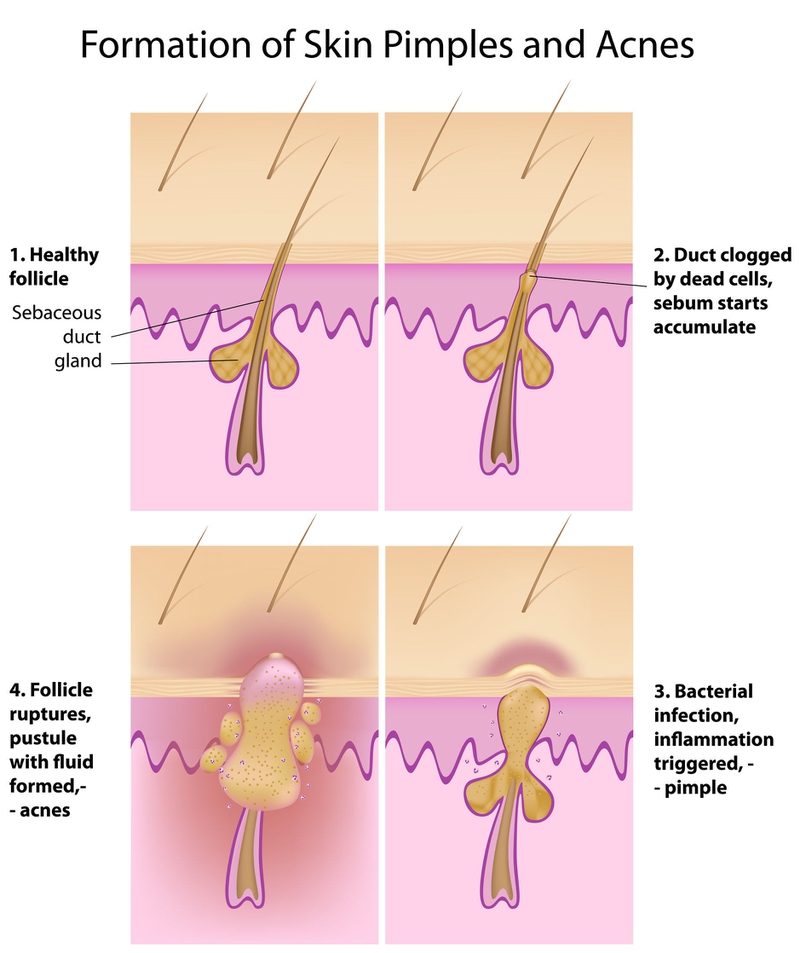Pimples, acne, zits, and smudges are among the natural skin problems encountered by nearly all teenagers and many grown-ups. Some of them are fortunate enough to have occasional breakouts while others are bothered with recurring issues. The pimple is described as a skin inflammations wherein the fatty oil glands are infected with bacteria. Your skin puffs up and gets filled with pus. A glut of discharge by oil glands is said to be the primary cause of this problem. Pimples normally emerge on the face, neckline, back and shoulders. You don't need to worry since this is not a grave condition. However, pimples can make a person feel miserable due to their unsightly appearance.

What Causes Pimples?
The causes of acne remain unknown until only recently. However, some doctors believe that there are certain factors that produce this skin irritation. One is the increase of hormones during teenage years. This can cause oil glands to get plugged up frequently. Hormonal changes in women during pregnancy and menopause also lead to the development of acne among women. The intake or stopping the use of birth control pills is another culprit. Heredity is another probable cause. Children simply inherit the acne problems of their parents. Lastly, oily makeup and some varieties of prescription medicines can also produce more pimples.
What Can I Do to Help the Pimple Go Away?
Keep Facial Hygiene
Wash your face at least twice a day but it should not be more than this frequency. Wash your face thoroughly to remove contamination, lifeless skin cells, and extra oil from the surface of your skin. Make sure that you use warm water and soap. Rinse gently and refrain from scrubbing the skin.
As spectacles collect sebum and skin membrane, see to it that you clean your glasses frequently.
Keep your hands and nails as clean as possible by washing them regularly with soap and water. Your fingernails should be cut short at all times so as not to accumulate skin irritants.
Natural skin layers accumulate in the hair follicles. Maintain the cleanliness of your hair on a regular basis. Try to keep hair away from your face since this can also irritate the skin.
Avoid Popping the Pimple
Take care not to crack your pimples. It is a possibility that you will just depress the infection by doing this. It can lead to more severe congestion, greater swelling and ruddiness. Bursting pimples also increases the risk of causing deep pock marks on your skin.
Stop Touching Your Face
Refrain from touching your face with your bare hands. This may call for willpower but you have to get accustomed to this practice. Do not allow the telephone receiver to touch your face either. It may contain skin dregs or oily secretion which can cause irritation and acne.
Wear Loose Fitting Clothes
Wear loose garments if pimples are scattered on different parts of your body such as the chest, back or shoulders. Avoid wearing caps and headdresses whenever possible. Wash these accessories regularly if you really need to wear them. This will allow your skin to breathe freely.
Wash Makeup Off
Remove all the makeup from your face before going to sleep. Do not use cosmetics containing chemicals that will irritate the skin. Check the labels for manufacture guidelines for instructions.
Be Careful When You Shave
Be careful while trimming hair on your face. You can use safety razors or electric shaving equipment. The skin can be more elastic if you use warm foamy water. Apply the appropriate cream before you start to shave. Remember that your skin will be more resilient after taking a warm shower.
Avoid the Ultraviolet
Ultraviolet rays from the sun can lead to skin damage. In fact, certain acne medications may even make your skin more sensitive to sunlight. Do not stay long under the sun especially between the hours of 10 in the morning and two in the afternoon.
Use Natural Methods
Ice. Wrap ice in a piece of cloth and press it on the affected skin area for a few seconds. Wait for several minutes and repeat the process. Repeated application reduces swelling and alleviates the skin immediately.
Garlic. Garlic is an anti-oxidant and anti-fungal agent that helps treat pimples quickly. Cut the garlic clove into pieces and rub these on your pimples. Allow it to stand for five minutes before washing with lukewarm water.
Lemon. Lemon juice helps pimples dry faster. Immerse a clean cotton swab in fresh lemon juice and apply on the pimples before you go to sleep at night.
Honey. Honey is a source of natural antibiotics that can prevent infections. Use clean cotton to apply the honey and leave it on the pimple for ½ hour. Wash the skin with lukewarm water.
Fresh Aloe Vera. Antibacterial properties of Aloe Vera are effective in the treatment of acne. It also prevents bacteria from tainting acne lesions and speeds up healing.
Medical Treatments for Long-Term Pimples
Over-the-counter acne products
Try an over-the-counter product since this does not require a doctor’s prescription such as benzoyl peroxide, salicylic acid and alpha hydroxyl acids. Start with a small amount initially. Use the product with care if your skin is easily upset.
Acne is by and large not a serious medical condition. Yet, it would be advisable to consult a skin specialist for pimples or swollen carbuncles. This will avoid disfigurement or other skin problems. Acne and blemishes can affect your self-esteem.
Incise and drain
Seek professional treatment if homemade solutions are not working. The deep breakouts can be cut and drained.
Inject cortisone
Cortisone injections are also effective provided this is done by a dermatologist.
Sometimes you may get under-the-skin pimples which can be painful and irritating. Watch this video to learn how to treat pimples under the skin:

View All Comments /Add Comment